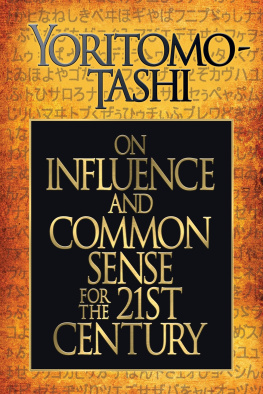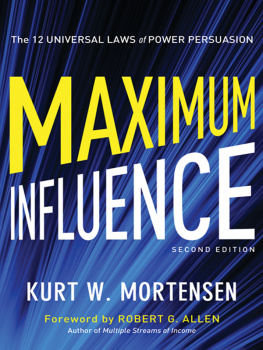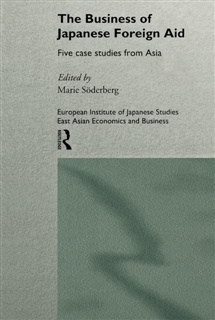INFLUENCE
HOW TO EXERT IT
* * *
B. DANGENNES
YORITOMO-TASHI
*
Influence
How to Exert It
From a 1916 edition
ISBN 978-1-62011-546-6
Duke Classics
2012 Duke Classics and its licensors. All rights reserved.
While every effort has been used to ensure the accuracy and reliability of the information contained in this edition, Duke Classics does not assume liability or responsibility for any errors or omissions in this book. Duke Classics does not accept responsibility for loss suffered as a result of reliance upon the accuracy or currency of information contained in this book.
Contents
*
Announcement
*
Yoritomo-Tashi, whose precepts are presented in this book, ranks as one of the three greatest statesmenthat Japan has ever produced. He was her most illustrious and wise Shogun, and, as founder of the firstJapanese dynasty of Shoguns, the reviser of the Empire's code of laws, and the organizer of militaryfeudalism, he rescued his native land from the slough of demoralization into which it had sunk. In 1186 heestablished the seat of his government at Kamakura, where he organized an administrative body similar inits methods and operation to the metropolitan government. From what is known of his public career, it isevident that the great Shogun exercised a dominant influence over the minds of his people. To him the artof influencing others was the key to Success. The great philosopher believed that the spirit of theindividual continuously exerts influence, even as the flower also exerts influence by spreading itsfragrance in the air. But just as the blossom cannot tell whither its fragrance spreads, so none of us can sayhow far our influence may reach. To an anonymous writer we owe the thought that "Influence neverdies. "Every act, emotion, looks, and word make it felt for good or evil, happiness or misery.
In the twelve lessons that Mr. B. DANGENNES has drawn from the writings of Yoritomo-Tashi, andpresents in this book, the manner in which Influence may be exerted and the means by which it may beexerted and the means by which it may be exercised are considered. One lesson is devoted to the increaseand expansion of psychic forces to awaken the dormant energies within us; another explains howinfluence may be exerted by persuasion and suggestion; a third shows the value of the fix idea whensupported by logical arguments; a fourth treats of the magnetic influence of the human eye and providesexercises for its development; a fifth deals with the power of good example; a sixth points to value ofperseverance - the achievement of great things by utilization of spare moments; a seventh emphasizes thepower of concentration, and provides exercises for its acquisition, and an eighth shows that byexchanging confidence one may exert a mighty influence that can benefit even those suffering frommental and physical ailments. "Confidence," says Yoritomo, "is the foundation of courage and themainspring of action. "How much our own EMERSON believed in this aphorism he has told us - "Trustmen and they will be true to you; treat them greatly and they will show themselves great. "To confide inanother, even though one is betrayed, is better than to conceal. The man who suspects evil is seeking in hisneighbor for the very thing that he sees in himself, while he who exerts a useful influence is the man ofstrength and initiative who consecrates his energies to the achievement of that which is good.
Throughout the following pages the Editor has provided suggestions, examples, and exercises as aids tothe Reader in the acquisition of this, the desirable art of knowing how to influence others in the world atlarge.
THE PUBLISHERS
Foreword
*
The success that has attended the publication of "Timidity Overcome" has encouraged me to print theprecepts of Yoritomo-Tashi.
The attention of the public is now turned toward the old Shogun, whose doctrine, ringing with truth, is asapplicable to the needs of our own day as in the time when it was first revealed.
Moreover, it is embellished with legends, gentle smooth, grassy slope on which appear, here and there,scattered among rough oak trees, the rarest and most exquisite flowers.
Thus it is with a deep and serious joy that I have again opened the manuscripts of my friend, the deceasedCommandant B-, to transcribe in out own beautiful language the precepts and reflections of him whowas at once a leader of men and a spiritual guide.
We find them veiled, as it were, under a robe of gray velvet, a dull vestment that the years wove ofwritings of men, but, without fearing the light cloud that soon will powder my own locks, I reread hisvibrating phrases of persuasive clearness and convincing sincerity.
Again, little by little, I feel myself swayed by the charm already experienced; and the influence of thesewords, which seem to spring from the very beginning of time, and to have been diffused throughout theworld, attract me and enthrall me with the doctrines of his philosophy in ever-increasing admiration.Influence! That almost magical word, what things it suggests!
To influence others! What a marvelous gift, and what assured success to him that possesses it!
He will know only by name the torments born of antipathy and of the loneliness of self-isolation from therest of mankind.
The weaknesses of the will, the terrors that cause the rise of the phantom of agonizing doubt, will bestrangers to him.
Both the spirit and the body will be under command.
The griefs of life never will completely overwhelm him, for, having foreseen them; he will know how tomitigate them.
He will have the joy of seeing that men's hearts, under the influence of his word and his example, willopen to pure and noble sentiments.
The art of succeeding will become familiar to him, for he will know how to attract to himself voluntarycollaborators.
In short, his power will set him apart as a being different from others, and, to use an ancient Japanesesaying, filled with dominating power:"He will build his palace on the bones of the timorous."
Little by little, the radiating action of this expanding will acts on me; why not try, through Yoritomo, tospeak of this art, more magnificent than all others, since it renders contagious the cult of proselytism andshows us how to prevent it from becoming sterile.
To influence others is not to play the part of creator, since it brings to life in the minds of men an ideawhich without its aid never would have germinated.
Is it not to become a sort of providence, since good influence buries vice, the source of unhappiness andrestlessness, to install instead perfect calm, the joy of living, and the security which always precedeshappiness, or at least allows us to maintain ourselves in that state which most nearly approaches it.With fervor, then, I have once more unfolded the writings of the philosopher, to transcribe the maximsand the luminous legends that make the study of his work so special and so attractive.
Although all truth is eternal, I trust that in this book, as in others that have preceded it, the reader will feelthe undeniable and peculiarly genial attraction of the doctrine that the ancient Shogun exercisesover the minds of those that know how to grasp and comprehend it.
B. DANGENNES
Lesson I - By the Increase and Spread of Psychic Forces
*
"There is a country situated no far from the River Yet-Sin," said Yoritomo, "wherein certain villages arerenowned for the curative property of the air."














